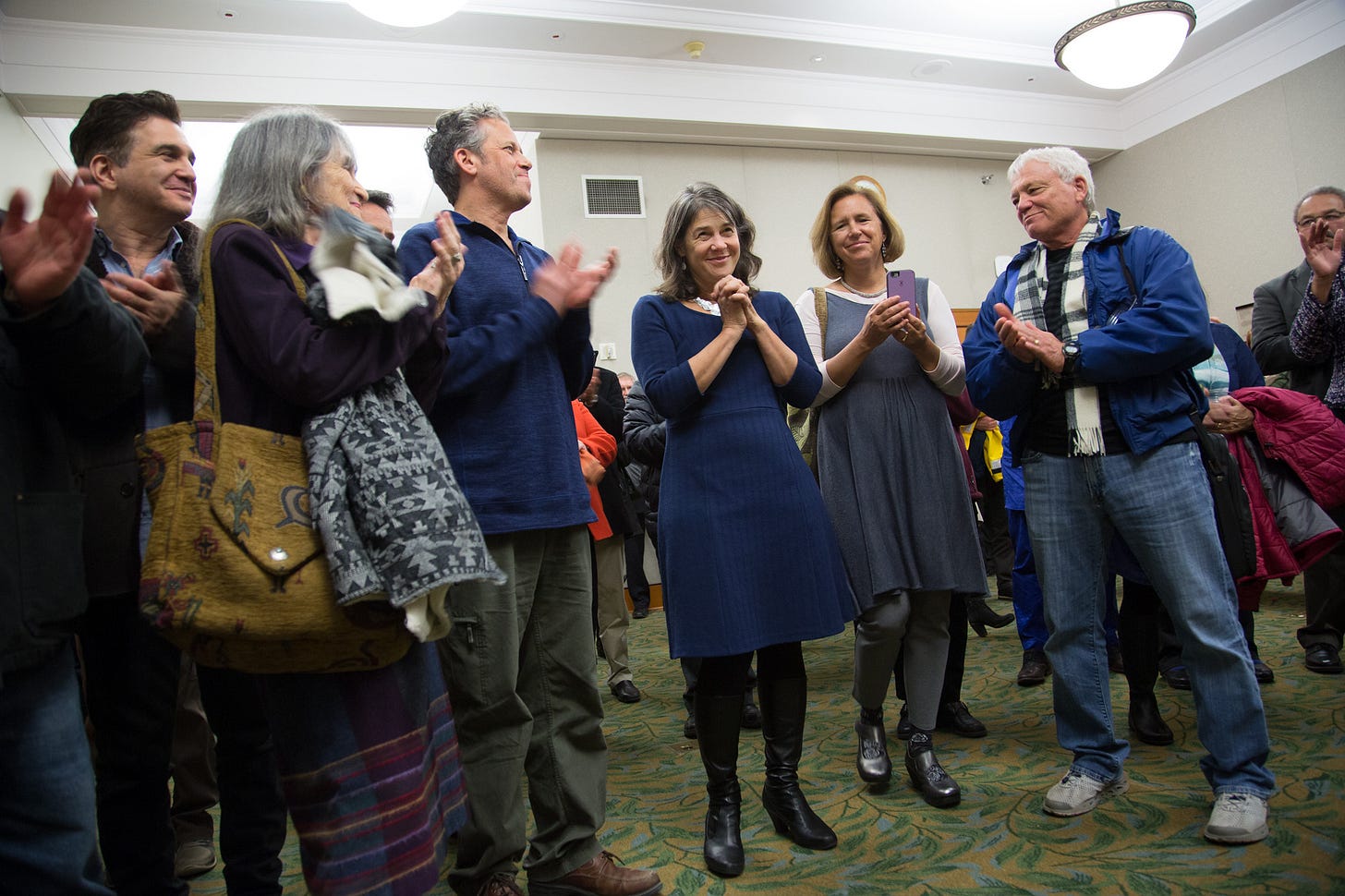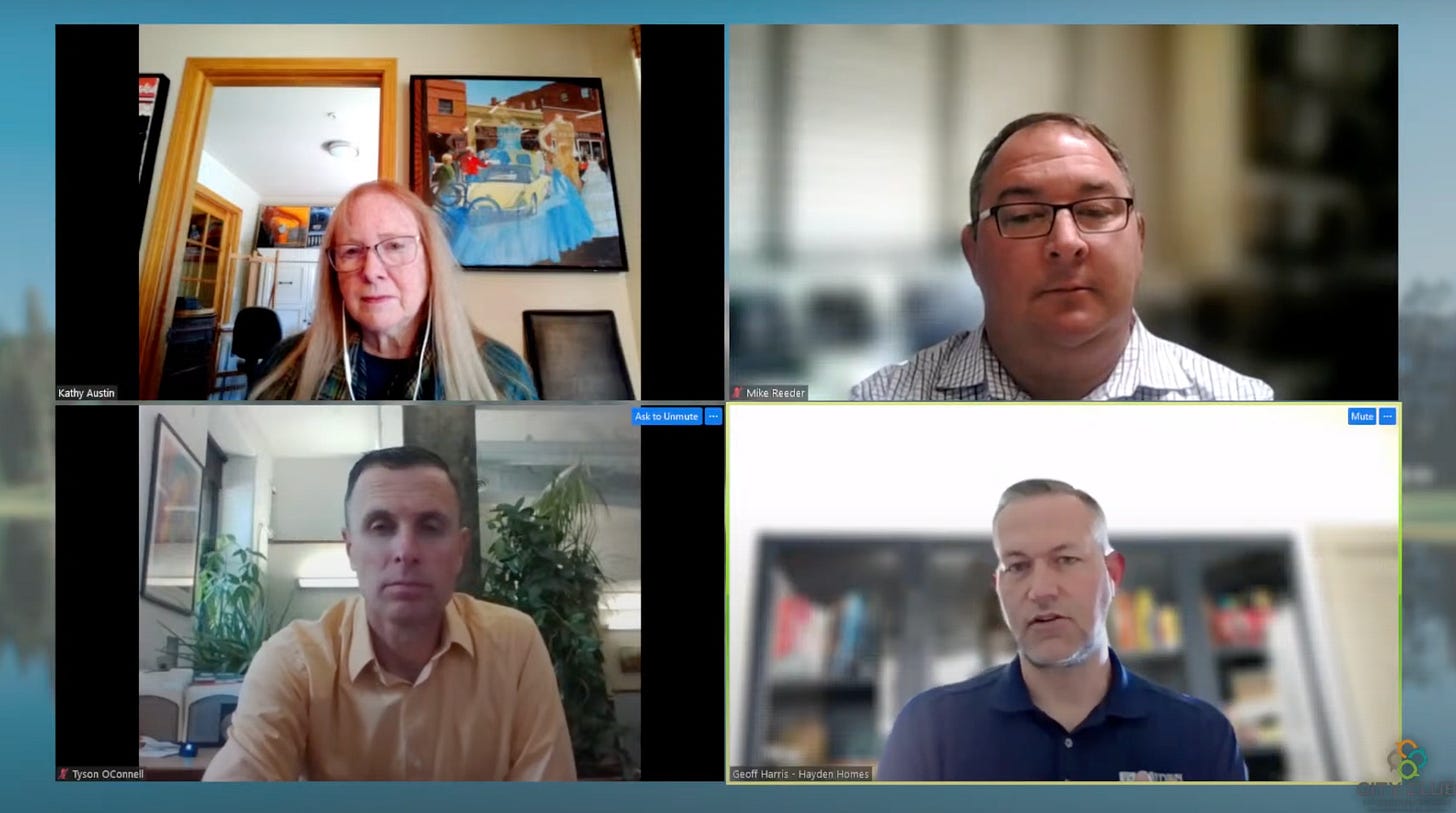The Way: Built for Zero is Both Practical and Compassionate, Critiquing the Risk Assessment on Public Schools, and the Upcoming 90-Day Plan for Oregon's Mental Health Crisis
This week's authors: Multnomah County Commissioner Sharon Meieran, John Rexford, Laurie Wimmer, and Jessie Burke. PLUS, how can cities and the legislature make it easier to build more housing?
Thank you for reading The Oregon Way! If you like our newsletter, please share it with a friend.
This Week on The Oregon Way:

1. Commissioner Sharon Meieran says a “By-Name List” is a proven strategy to cut homelessness
Sharon Meieran, Multnomah County Commissioner for District 1
Problem: At the heart of any effort to tackle homelessness, a county or a city will struggle to deliver services to a population that lives without an address or phone number. The numbers of people living on the streets can fluctuate as people migrate in and out of the city, and metrics for success can seem dependent on more significant, structural issues that a single municipality or regional government cannot solve on its own.
Why This is Worth Reading: Multnomah County and Portland have partnered with Community Solutions to bring its “Built for Zero” program to the region. Since a recent article in Willamette Week, in which activists compared the program’s by-name list to Nazi and Soviet tactics of minority persecution and genocide, controversy has flourished. In her op-ed, Commissioner Meieran explains why Built for Zero is necessary and compassionate and how it will help Portland and Multnomah County tackle the humanitarian crisis it now faces.
2. Two education professionals say the Secretary of State’s Audit Division’s judgment of K-12 is flawed
John Rexford, Chair of the Oregon Quality Education Commission
Laurie Wimmer, CEO and Founder of Oregon Policy Analytics
Problem: The Oregon Secretary of State’s Audit Division’s risk assessment of the public K-12 education system is overly reliant on test scores to measure school and student success. Our authors write that faulty metrics can lead to misdiagnoses of Oregon’s problems in its education system.
Why This is Worth Reading: Comparing Oregon to other states can lead one to misunderstand our schools' issues. Instead, the authors recommend focusing on what matters and the solutions we already have to achieve those metrics. There are still problems to solve in the wake of Oregon’s Student Success Act. Wimmer and Rexford give lawmakers three things they must focus on and urge them not to get lost in the noise.
3. Old Town Community Association President plans to take on the mental health crisis on Portland’s streets
Jessie Burke, president of the Old Town Community Association and owner of The Society Hotel
Problem: Portland’s leaders, says Jessie Burke, struggled during the pandemic to take action on homelessness because there were too many disparate opinions. In Old Town, the pandemic emptied the streets of pedestrians and customers, leaving business owners like Burke alone to watch as gun violence and street encampments spread. She says it felt unsafe and lonely, and without city and county workers returning to their buildings every day, they didn’t believe the situation she described.
Why This is Worth Reading: Burke launched a media strategy in March to get city and county leaders to work with the community. She wrote the Old Town 90-Day Reset Plan that Mayor Wheeler expanded citywide two weeks ago. She talks to us about what will come next for her, including her new 90-Day Plan for the county and state levels on the mental health crisis.
This Week’s Featured Idea:

What’s next for Oregon’s housing push?
City Club of Central Oregon video forum: “Working Together to Create Affordable Housing.”
The Question: Housing is unaffordable. Oregon has deregulated its housing market to spur new development. But Oregonians probably won’t see the effects of these regulatory changes for years. What hurdles remain for legislators and city councilors to lower?
Where Should They Look Next: In the video, two developers of Affordable and workforce housing in Central Oregon break down the many obstacles to getting new projects off the ground. Three they cite —
There is too little buildable land, making it often too expensive for more affordable housing. Without cheap land available, developers lack the will and private financing to take on these projects.
Financing is too expensive to attempt these projects and is generally hard to come by.
Burdensome state and local sustainability and construction laws and restrictions and approval times increase the building costs.
As city councilors and legislators look for more solutions to the housing shortage, they might start by trying to solve these three issues: the availability of land and financing and the simplification of building codes and approval processes. The two developers talk more specifically about the problems they face and possible solutions starting at minute 24:30 of the video.
Call Back:
Eric Paine, the CEO of Community Development Partners, wrote for us in April about affordable housing and how cities and the state can continue to take action on the issue. His recommendations are still relevant. Read them here.
Also Noteworthy:
With Roe v. Wade overturned, Oregon’s abortion access remains. But what can Oregon and Washington do to help women in need in our neighboring states? Sightline Institute gives a couple of ideas. (Valerie Tarico, Sightline)
Willamette Week’s Quote of the Week was from an article in the Northwest Labor Press featuring Portland police officer Jordan Zaitz. It is worth reading. Among her thoughts, the police union is a comfort to officers who still don’t feel appreciated in the city they serve. (Devin Boone, Northwest Labor Press)
How can PNW cities make their streets cooler a year after the infamous heat dome? Plant more trees. (Jonathan Maus, Bike Portland) And build fewer parking lots. (Katie Gould, Sightline)
With dams being removed, water reservoirs in southern Oregon that have been used to fight fires are going away. The CEO of Klamath River Renewal Corporation, the non-profit overseeing the removal of the dams, talks about the plan to support firefighting efforts without the reservoirs. (“Think Out Loud,” OPB)
With a drought in southern Oregon, water is essential right now. Oregon regulates water use and has a department of state government — the Department of Water Resources — to do so. Yet, some cities and utilities refuse to disclose where water is going and how much is being used. Should Oregon allow this? (Randy Stapilus, Oregon Capital Chronicle)
Two board members of HereTogether, a coalition of Portland business groups and nonprofits, explained that Community Solutions’s Built for Zero program is not just the By-Name List. It is a commitment to end homelessness, as Portlanders currently know it. (Mitch Hornecker and Laura Golino de Lovato, Oregonlive/The Oregonian)
The O's editorial board praised Secretary of State Shemia Fagan’s proactive recommendations in the Audit Division’s systemic risk report on K-12. (Oregonlive/The Oregonian)
To Do:
Read this week’s edition of the Liftoff. Alex and Ben cover how Oregon’s leaders reacted to the end of Roe v. Wade (though abortion access in Oregon will not change); a Democratic candidate suddenly dropped out of his race, possibly boosting Republicans’ chances; Governor Brown is skeptical of a recent Biden proposal; and, Senator Wyden accused the Saudis of covering up a hit-and-run in Oregon!
Listen to this week’s episode of our podcast, the Oregon Bridge, with Emerson Levy, District 53’s Democratic candidate for the Oregon House of Representatives. District 53, which is in Central Oregon, leans Democratic. In a midterm election cycle where Democrats are expected to lose seats nationally, can Levy gain another seat for the Democrats in the legislature? In this interview, they talk about her district, how redistricting changed the dynamics of the race, school safety, and more!
Tips? Feedback? Ideas? Corrections? Let us know how we can improve!
Thank you for reading.
If you value our content, please become a paying subscriber today. Your support will help us grow and offer more opportunities to this community. It’s just $10 a month!

